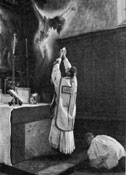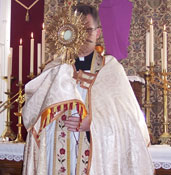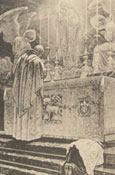Preceding the “public“ Mass and ordination ceremonies, each ordinand from an SSPX seminary will take the followings Oaths in private, normally in the presence of the Rector of the seminary
THE PROFESSION OF CATHOLIC FAITH Solemnly promulgated by Pope Pius IV and the Council of Trent. Issued in the year 1564 in the Bull Injunctum nobis
THE OATH AGAINST MODERNISM Given by His Holiness St. Pius X September 1, 1910.
THE OATH OF FIDELITY Pius XI, 1922-1939)
At the administration of Holy orders the bishop lays his hands on the candidates for ordination, calls down upon them the Holy Ghost, anoints their hands, and presents the sacred vessels to them.
They thereby receive, In addition to a plenitude of grace, the sacerdotal powers: more especially the power to offer the holy sacrifice and to forgive sins.
We read that the apostles consecrated Paul and Barnabas with prayer and imposition of hands (Acts 13 3), and in like manner Paul consecrated Timothy (2 Tim 1, 6). The sacrament of Orders was unquestionably instituted by Our Lord at the Last Supper.
The office of priesthood, to which a man is raised by Holy orders, is one of great dignity, but likewise one of no slight difficulty and of vast responsibility.
 The priesthood is the highest dignity upon earth. It surpasses that of kings and
emperors, nay even of the angels themselves. "For", as St. John Chrysostom remarks
"the power of kings is only over the bodies of men, whereas that of the priest is
over their souls." On the priest are conferred powers not accorded to angels; for
to what angel was it ever given to convert bread into the body of the Lord by his word?
And not all the angels together could grant pardon for a single sin. By his office
a priest is only concerned with heavenly things; he stands between God and man:
he lays our petition before the Most High and conveys divine graces to us.
He is a mediator between God and man, the angel of the Lord of Hosts (Mal 2, 7)
the messenger of God to make known His will to men. He is God's representative,
His ambassador, His plenipotentiary, therefore whatsoever honour we show to the
priest, we pay to God himself. Does not Our Lord Himself say "He that heareth
you heareth Me; and he that despiseth you, despiseth Me" (Luke 10, 16).
In fact St. Peter Damian says, God actually follows the priest, for what
he declares on earth is ratified in heaven; and at His word the Second
Person of The Holy Trinity becomes flesh beneath his hand as at the
incarnation. Hence we do well to address the priest as "Your reverence".
St Francis of Assisi used to say that if he met an Angel and a priest
at the same time he should salute the priest first.
The priesthood is the highest dignity upon earth. It surpasses that of kings and
emperors, nay even of the angels themselves. "For", as St. John Chrysostom remarks
"the power of kings is only over the bodies of men, whereas that of the priest is
over their souls." On the priest are conferred powers not accorded to angels; for
to what angel was it ever given to convert bread into the body of the Lord by his word?
And not all the angels together could grant pardon for a single sin. By his office
a priest is only concerned with heavenly things; he stands between God and man:
he lays our petition before the Most High and conveys divine graces to us.
He is a mediator between God and man, the angel of the Lord of Hosts (Mal 2, 7)
the messenger of God to make known His will to men. He is God's representative,
His ambassador, His plenipotentiary, therefore whatsoever honour we show to the
priest, we pay to God himself. Does not Our Lord Himself say "He that heareth
you heareth Me; and he that despiseth you, despiseth Me" (Luke 10, 16).
In fact St. Peter Damian says, God actually follows the priest, for what
he declares on earth is ratified in heaven; and at His word the Second
Person of The Holy Trinity becomes flesh beneath his hand as at the
incarnation. Hence we do well to address the priest as "Your reverence".
St Francis of Assisi used to say that if he met an Angel and a priest
at the same time he should salute the priest first.
 The
sacerdotal office is also one of immense responsibility and great difficulty;
the obligations resting upon the priest are neither few nor light. He has to
recite the breviary daily, which cannot be done under an hour and a quarter; he
is pledged to lifelong celibacy; he has to visit the sick at any hour of the day
and night when he may be called upon; he has to take the last sacraments to the
dying, however contagious the disease from which they are suffering; he has
often to sit for long hours in the confessional, to fast late on account of the
late Masses; he is bound to renounce all worldly amusements, to be liberal
towards the poor, and much more besides. Priests ought to be the salt of the
earth (Matt. 5 13)
The
sacerdotal office is also one of immense responsibility and great difficulty;
the obligations resting upon the priest are neither few nor light. He has to
recite the breviary daily, which cannot be done under an hour and a quarter; he
is pledged to lifelong celibacy; he has to visit the sick at any hour of the day
and night when he may be called upon; he has to take the last sacraments to the
dying, however contagious the disease from which they are suffering; he has
often to sit for long hours in the confessional, to fast late on account of the
late Masses; he is bound to renounce all worldly amusements, to be liberal
towards the poor, and much more besides. Priests ought to be the salt of the
earth (Matt. 5 13)
Nor must it be overlooked that zealous priests are in the present day frequently the object of suspicion and persecution, and their apostolic labours are ill rewarded. The ardent followers of the world are inclined to treat their priests like the dog in the fable, which bit the hand that was stretched out to save him from drowning.
If the wolf comes and rends the sheep, the shepherd is taken to task. So it is with the priests; they have to render an account of the souls committed to their charge. (Heb 13, 17). "The duties of those who will have to give account for souls", says St Bernard, "are heavy and onerous". On the day of his ordination St John Chrysostom said "I now need your prayers a thousand fold more, lest in the Day of Judgement, I should be cast into the exterior darkness."
Since the sacerdotal office is in itself an office of such great dignity, we owe profound respect to the priest on account of his office, even if his life should not correspond to it.
Nothing can take away the dignity attaching to the priestly office, not even an ungodly life; therefore we ought always to entertain great reverence for it. Even pagan monarchs have been known to manifest deep veneration for the priests of the true God. Almighty God permits his priests to be encompassed with infirmity, in order that they may have the more compassion on them that are ignorant and that err (Heb. 5, 2). St Francis of Sales said of priests "I will close my eyes to their faults, and only see in them God's representatives."
"Are we" asks St. Augustine. "To think slightingly of Christ and the apostles, because there was a Judas among them? Who will show me any body of men upon earth who are without faults?"
How blameworthy are those who publish far and wide the misdeeds of a priest!


The Church sings in her Passion chant, the cross is "a tree beautifully adorned, environed with light, a noble tree, selected from all trees; no forest produces its equal in foliage, blossom and fruit." The noble tree of the cross was besprinkled with the blood that gushed forth from the body of the Lamb. Hence its branches are full of blossoms of grace and fruits of life; and its foliage, which neither withers nor falls, avails for the salvation of nations. (The holy Sacrifice of the Mass Ghir)

